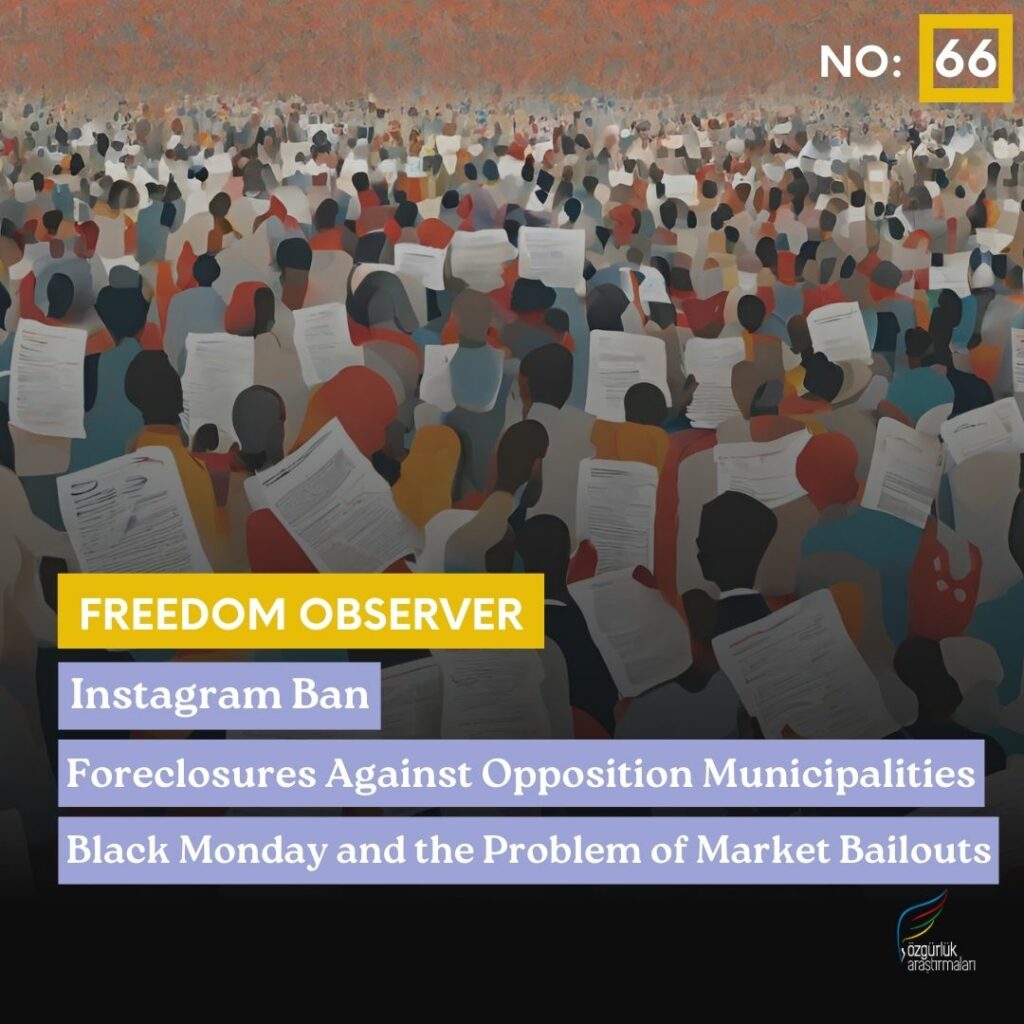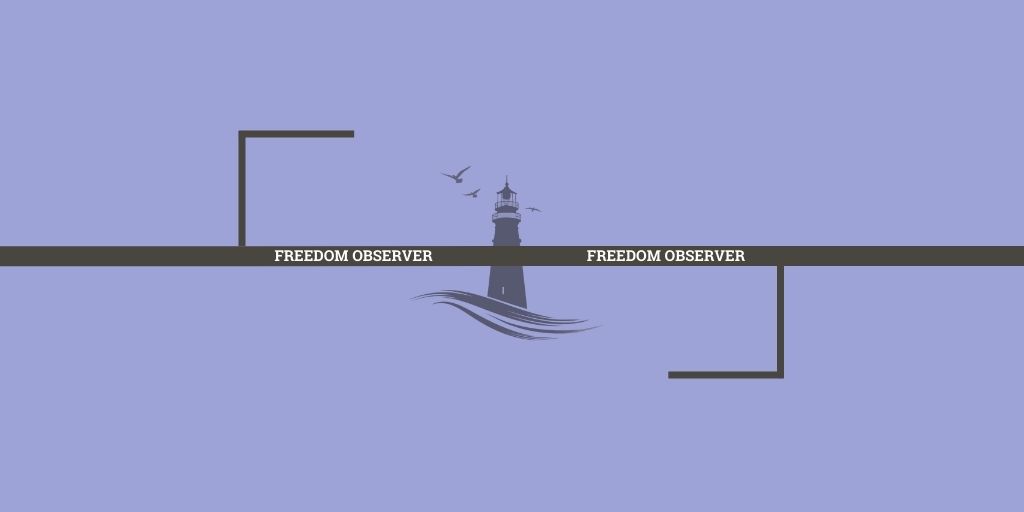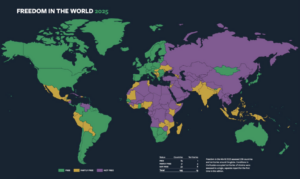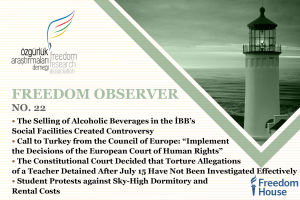
From Editor-in-Chief
Turkish politics has witnessed significant developments in the past week and a half. Two events—the government’s blocking of access to Instagram and President Erdoğan’s accusation that those who criticized him were ‘morally corrupt’—were widely discussed and criticized.
The decision to block access to Instagram stems from the government’s anger over Instagram’s refusal to publish condolence messages regarding Hamas leader Ismail Haniyeh, who Israel killed. According to the statement made by the relevant minister, the government now routinely imposes social media bans to protect the ‘values’ of society. Once again, we have learned that these ‘values’ do not include human rights, such as freedom of expression, which are inherent and independent of the government’s approval or the majority’s ‘values.
The President’s angry characterization of citizens who criticized this decision as ‘morally corrupt’ reflects the AKP government’s categorical rejection of citizens’ freedom of expression and their democratic right to criticize the government. Above all, according to the Constitution, the President has the honor and duty to represent the ‘unity of the nation.’ However, it is incomprehensible that the President has made a habit of attacking the individuals of the ‘nation’ he represents with language that is far from dignified.
Meanwhile, a new development has recently occurred regarding the issue of Can Atalay’s parliamentary status, which has remained on Turkey’s agenda since last year’s general elections. As you may recall, Can Atalay, elected as a member of parliament from the Workers’ Party of Turkey, was prevented from taking the oath and assuming his duties due to a criminal conviction. Despite a ruling by the Constitutional Court declaring this action unconstitutional, his parliamentary status was formally revoked through a vote in the Grand National Assembly. Following Atalay’s appeal, the Constitutional Court recently issued a decision stating that the revocation of his parliamentary status is ‘null and void.’ This means that the next step falls to the Speaker of the Grand National Assembly, who must now take the necessary steps to reinstate Can Atalay as a member of parliament. By doing so, the Speaker will not only remedy Atalay’s grievance but, more importantly, uphold the ‘rule of law’ for the nation.
We must also address two pieces of news that, when considered together, create a bitter irony. On the one hand, Turkey has risen to a level where it can rank on global lists due to the advancements it has made in the defense industry. On the other hand, according to OECD data, six and a half million children in the country are suffering from extreme poverty. Five Turkish state-backed companies specializing in defense and aerospace technology (ASELSAN, TUSAŞ, ROKETSAN, MKE, and ASFAT) have entered the ranks of the world’s top 100 defense companies. The irony is that while Turkey has become a modest ‘world power’ in weapons and aerospace technology, it is languishing in terms of economic and social development, as well as standards of living. In this country, where more than half of the population struggles with poverty and millions of children living in extreme poverty go to school hungry, the nation’s resources are being funneled into armament and other military technologies under the guise of the ‘defense industry.
Lastly, Turkey has finally submitted a request to intervene at the International Court of Justice in The Hague concerning the genocide case against Israel eight months after the case was initiated. However, as you may recall, while Turkey vehemently championed the ‘Palestinian cause’ and sharply condemned Israel, particularly in front of domestic audiences, it continued to provide technical equipment support to Israel through trade. It was only after mounting public criticism that Turkey decided to impose restrictions on exports to Israel. Nonetheless, this does not signify any substantial or forthcoming change in Turkey’s relationship with Israel. Meanwhile, the trend of recognizing the State of Palestine has gained momentum among Western countries, with Norway and Ireland following Spain in deciding to recognize Palestine.
In this issue, Ali Rıza Çoban provides a legal analysis of the Instagram ban, Ömer Faruk Şen examines the government’s initiation of foreclosure proceedings against opposition municipalities, and Can Gerek highlights the economic effects of ‘carry trade’ operations within the context of the global economy and the problems caused by corporate bailouts disrupting the normal functioning of markets.
See you in the next Freedom Observer!
* Prof. Dr. Mustafa Erdoğan
Instagram Ban
On the morning of August 2, 2004, Turkey woke up to the news that Instagram, the social media platform with the most users in the country (48 million), had been blocked. The legal uncertainty surrounding the reason for the ban persists. The Information and Communication Technologies Authority (BTK) only announced the date and number of the decision to block access but did not share the decision itself with the public. Therefore, the specific legal basis for the decision remains unknown. From the statements of the Minister of Transport[1] And the Deputy Minister2, the ban appears to be based on the fourth paragraph of Article 8 of the Internet Law No. 5651. However, as will be explained below, the actual reason seems to be more political than legal. The statements made do not meet the conditions stipulated in Article 8/4 and instead reflect the government’s reaction to Instagram’s refusal to publish condolence messages for Hamas leader Ismail Haniyeh, who was killed in Tehran.
Article 8 regulates the investigation of internet publications that constitute a criminal offense and the blocking of access to these publications as a precautionary measure. The first paragraph of the article lists ten specific crimes to which these measures can be applied. These crimes include obscenity, prostitution, sexual exploitation of children, encouraging drug use, incitement to suicide, providing a place and opportunity for gambling, offenses against Atatürk, illegal betting, and the disclosure of documents and members of the intelligence organization.
If there is sufficient suspicion that online content constitutes any of these crimes, it is possible during the investigation and prosecution process for a judge or court to order the removal of the content or the blocking of access to the relevant publication. However, the fourth paragraph of Article 8 grants the President of the Information and Communication Technologies Authority (BTK) the authority to order the removal of content and the blocking of access as an administrative measure for these offenses. While the scope of this authority was initially much narrower, it has been progressively expanded through Laws No. 6518, 7226, and, most recently, Law No. 7418, enacted in 2023. Previously, this authority was limited to crimes related to the sexual exploitation of children and obscenity, where the publisher was located abroad. However, with the recent amendments, the scope has been broadened to include all offenses listed in the first paragraph, regardless of whether the publisher is based domestically or abroad.
In 2017, the Constitutional Court annulled this authority about the crime of obscenity.3 However, instead of complying with the Constitutional Court’s decision, the government introduced amendments that progressively expanded the scope of this authority. In 2023, the Constitutional Court issued another ruling, annulling the authority granted to the President of the Information and Communication Technologies Authority (BTK) by Law No. 7253 to remove content.4 The Court emphasized that the rule, which grants the BTK President the power to determine whether an action constitutes a crime and to ban content without judicial oversight indefinitely, violates the presumption of innocence. There is no doubt that this reasoning is equally applicable to decisions regarding the blocking of access.
In statements made by various government officials, it is claimed that Instagram was blocked entirely because it failed to comply with requests related to ‘catalog crimes.’ However, the crimes or specific content involved are not disclosed. 5 Additionally, according to the 17th paragraph of Article 8, decisions to block access and remove content must be made primarily on a URL basis. A complete ban is considered a last resort by law. The reason why a total ban was applied is also not explained.
In Meta’s transparency report dated July 31, 2024, which includes Facebook and Instagram, it is stated that during the period from January 1 to June 30, 2024, the company received 2,580 requests from Turkey concerning specific content, of which 504 pieces of content were removed for violating Meta’s policies, and 1,941 pieces of content were made invisible in Turkey. 6 This indicates that more than 95% of the requests from Turkey were addressed by the company.
From the statements made public, it appears that government officials have requested Meta to address issues like terrorism, which are not covered by Law No. 5651. The declarations by public authorities, who themselves do not comply with the law, accusing social media companies of non-compliance and emphasizing the rule of law, are unconvincing.
It is highly problematic that social media companies, in line with their own policies, remove certain content on the grounds of terrorism. Meta has an internal appeal mechanism (the Oversight Board) for such actions. However, in Turkey, there is no legal framework governing such practices by companies. The government is reluctant to regulate these areas transparently.
It also appears ironic that the government, which blocked access to Instagram for removing Hamas and Haniye-related posts on the grounds of terrorism, is now asking Meta to remove content it considers related to terrorism in order to lift the ban.
The arbitrary banning of a social media platform with 48 million followers in Turkey, where a significant amount of economic activity also takes place without any clear legal basis, shows that the country is increasingly surrendering to lawlessness.
* Doç. Dr. Ali Rıza Çoban – Constitutional Lawyer
Foreclosures Against Opposition Municipalities
In July, President Erdoğan addressed CHP Chairman Özgür Özel, saying, ‘If you want to benefit retirees, instruct your municipalities to pay their accumulated debts to the Social Security Institution (SGK).’ Shortly after, the Ministry of Labor and Social Security announced that it had sent notices via SGK to all indebted municipalities. Despite intense opposition criticism and the fact that most of these debts date back to when the municipalities were under AKP control, and despite the opposition labeling this move a ‘financial coup,’ the government has expressed its determination to persist with this course of action at various intervals.
Shortly after these statements, on July 30, foreclosure proceedings were initiated against the Mersin Metropolitan Municipality. The first response to this decision came from Mersin Metropolitan Mayor Vahap Seçer: ‘Naturally, the municipalities taken over in 2019 had a debt burden.7 We must not overlook SGK debts among these debt items. When we add SGK debts, tax debts, bank debts, and debts to companies and tradesmen for goods and services, each municipality took on a significant debt burden in 2019.’ Seçer also noted that 411 municipalities are governed by the CHP, and when municipalities managed by other opposition parties are included, a significant portion of the population lives in municipalities governed by opposition parties. He stated that this practice was aimed at causing difficulties for these municipalities.
CHP Deputy Chairman Gökhan Zeybek added that in 2024, the 100 municipalities with the highest population that transitioned from AKP and MHP to CHP control had inherited 9.8 billion Lira in tax debt and 20 billion Lira in SGK debt and that the government was attempting to pit CHP against retirees and minimum wage earners through this method. Ankara Metropolitan Mayor Mansur Yavaş also reacted to this practice, stating that ABB is owed 1.325 billion Lira from the Ministry of Environment and approximately 172 million Lira from Treasury sales, and he invited the government to ‘settle accounts’.
In the previous bulletin, we mentioned that the government had opened a new front against municipalities and mayors governed by opposition parties over SGK debts. Just a few weeks later, the AKP government promptly took action and initiated foreclosure proceedings against the Mersin Metropolitan Municipality. Another new front opened against opposition municipalities is the amendment to the Animal Protection Law, passed with AKP and MHP votes, which foresees prison sentences for mayors who fail to round up stray animals in shelters and do not fulfill their obligations. It appears that in the coming months, the AKP government will tighten its grip on opposition municipalities, using propaganda about their failures to manage debt and collect stray animals.
As a result, the service capacity of the opposition’s indebted municipalities will decline, and some mayors might even be sent to prison for not fulfilling their ‘obligations’ regarding stray animals. While this may seem speculative, it wouldn’t be surprising if, after a citizen is killed in a stray dog attack or dies while fleeing from a stray dog and getting hit by a car, an investigation is launched, and the mayor of that city, if from the opposition, is sent to prison once the incident goes viral on social media. However, seeing a similar situation for an AKP-affiliated mayor would likely only happen in a work of fiction!”
Turkey’s recent political history shows us that the AKP government often introduces seemingly ‘general’ and ‘objective’ regulations, only to later subject them to a ‘special’ and ‘subjective’ process of application and evaluation. As the Freedom Research Association, we will be closely monitoring the foreclosure proceedings initiated against municipalities and will regularly share the data we collect with our readers. Nevertheless, we can already predict that, driven by partisan motivations, the municipalities subjected to these proceedings will, in their entirety or overwhelming majority, be those governed by the opposition.
* Dr. Ömer Faruk Şen– Missouri University
Black Monday and the Problem of Market Bailouts
On Monday, August 5, global markets experienced a sharp downturn at the opening. The Japanese stock market saw sell-offs exceeding 10%, which began in the Asian markets and quickly spread to others. In addition to the stock markets, there was also heavy selling in cryptocurrency exchanges. Turkey was negatively impacted by the selling pressure emanating from Asia, leading to two circuit breaker triggers and a temporary halt in trading on the Istanbul Stock Exchange. There are two significant reasons why oil prices did not react noticeably to these sharp sell-offs.
The first reason is the accelerated unwinding of carry trade positions following the Bank of Japan’s decision last week to raise interest rates to their highest level since 2008. Carry trade, which has also been a frequent topic in Turkey recently, involves borrowing in low-interest currencies and investing in high-interest currencies. As long as exchange rates remain stable, carry trade yields returns equal to the interest rate differential between the two currencies. However, because this transaction carries exchange rate risk, it relies on the expectation that the currency in which the investment is made will not depreciate. For example, recent carry trade investments in the Turkish Lira reflect the expectation that the Lira will not significantly depreciate in the near future. Therefore, carry trade is crucial in determining the direction of international capital flows. However, potential currency depreciations and changes in interest rates can affect the attractiveness of carry trade. The rise in interest rates in Japan has reduced the appeal of trade transactions often carried out through the Japanese Yen, leading to unwinding and triggering a significant wave of sell-offs in the markets.
The second reason is the release of very weak economic data from the United States at the end of the previous week. These reports heightened concerns that the U.S., the world’s largest economy, is rapidly entering a recession due to the delayed interest rate cuts and that this recession could have global repercussions. Following these two developments, panic selling intensified, leading to even sharper declines. In the wake of these severe sell-offs, attention has turned to the U.S. Federal Reserve (FED). There is growing expectation that the FED will advance interest rate cuts to prevent a recession and rescue the markets when they face difficulties. However, the market’s reliance on the FED as a savior during every sharp decline brings with it several issues.”
The Expectation of Market Rescues and the Problems Arising
“The continuous rescue of markets when they face difficulties leads to several issues. The first is that financial institutions may behave more recklessly, taking on greater risks with the belief that they will inevitably be bailed out, which results in moral hazard. Moreover, injecting liquidity into the market during rescues often leads to an increase in the value of assets held by the wealthier segments of society, thereby exacerbating inequality. Additionally, such interventions distort market signals, negatively impacting the efficient allocation of resources. When rescue operations evolve into providing financial support, they impose a strain on the budget, leading to issues like higher taxes and inefficient use of resources. All these factors hinder the proper functioning of the market and, in the long term, impede productivity growth, which is the most critical indicator of economic growth.
Despite significant technological advancements since the late 20th century, there has been a noticeable slowdown in productivity growth. The famous economist Robert Solow captured this paradox with the remark, ‘You can see the computer age everywhere but in the productivity statistics.’ This slowdown in productivity is a frequent topic of discussion in economics, with the existence of zombie companies cited as a significant contributing factor. The presence of zombie companies brings to mind Joseph Schumpeter’s emphasis on the importance of ‘creative destruction’ for the proper functioning of a free market. Creative destruction is the process by which less efficient firms are replaced by more efficient ones. However, the continuous efforts of central banks and governments to rescue markets have allowed many zombie companies to survive with low productivity, preventing creative destruction from occurring. As a result, markets continue to call for a savior during each downturn, and the intervention by governments and central banks weakens competition, reduces productivity, and ultimately slows down long-term economic growth.” from the United States at the end of the previous week. These reports heightened concerns that the U.S., the world’s largest economy, is rapidly entering a recession due to the delayed interest rate cuts and that this recession could have global repercussions. Following these two developments, panic selling intensified, leading to even sharper declines. In the wake of these severe sell-offs, attention has turned to the U.S. Federal Reserve (FED). There is growing expectation that the FED will advance interest rate cuts to prevent a recession and rescue the markets when they face difficulties. However, the market’s reliance on the FED as a savior during every sharp decline brings with it several issues.
* Dr. Caner Gerek
1 Ulaştırma ve Altyapı Bakanı Uraloğlu, Instagram’ın katalog suçlarla ilgili taleplerin karşılanmaması nedeniyle erişime engellendiğini açıklamıştır. https://www.bbc.com/turkce/articles/c4gvvvgdyxeo
2 Bakan Yardımcısı Sayan da yaptığı açıklamada katalog suçlardan söz etti. https://x.com/ofatihsayan/status/1819343096397627540
3 AYM, E. 2015/76, K.2017/153, 15.11.2017
4 AYM, E. 2020/76, K.2023/172, 11.10.2023
5 https://x.com/evrenselgzt/status/1820768992807567819
6 https://x.com/cyberrights/status/1819751430011445626
7 https://medyascope.tv/2024/07/30/erdogan-talimat-vermisti-mersin-buyuksehir-belediyesine-sgk-borcundan-haciz/





